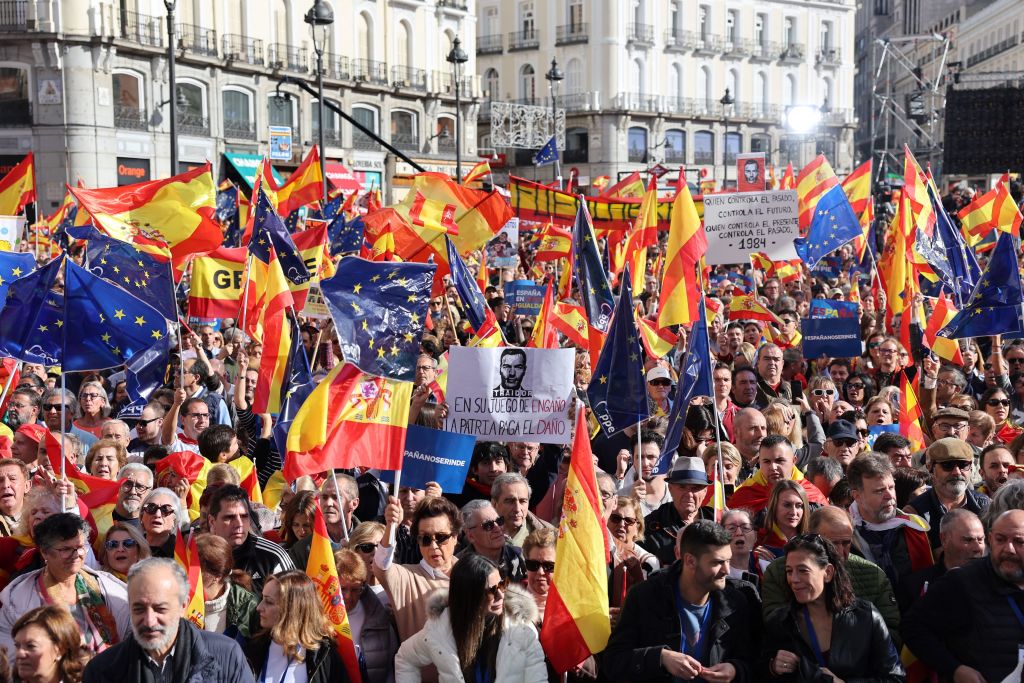An upright Englishman, some years after marrying into a Spanish family, finally breaks his cardinal rule. In a moment of sudden daring at an extended family lunch, he challenges the totem of the Spanish renaissance: the Euro. The stunned silence that follows this blasphemy is filled by one of his in-laws: ‘Aha! Just what I expected… I know exactly what you are… You’re an euroescéptico!’ ‘Eh-oo-ro-es-THEP-ti-co’, she repeats slowly, each of the seven syllables a hammer blow to the poor Englishman’s standing.
As this scene from the novel Spanish Practices suggests, the Spanish people’s faith in the European Union is often as blind as it is widespread – not a breath of criticism is permitted. In the referendum held in 2005, a massive 76 per cent of voters approved the treaty establishing a European constitution – although it then had to be replaced by the Treaty of Lisbon when voters in France and the Netherlands rejected it. Meanwhile school textbooks in Spain portray the EU as an unquestionably good thing.
Unsurprisingly, many Spaniards regard Brexit as a sort of national suicide. Its inevitable aftermath, the mainstream media likes to suggest, is an ever deeper economic and social crisis. When the topic comes up, my Spanish friends nod sadly to show their sympathy with my suffering and then tactfully change the subject.
In many ways this devotion to the EU is understandable. Auden described Spain as ‘crudely soldered on to Europe’ and that sense of not really belonging grew during the long decades of General Franco’s military dictatorship. When the longed-for membership of the European Economic Community arrived in 1986, Spaniards felt as if their country had, at long last, been accepted as a modern European democracy. Now no one would be able to say that ‘Africa begins at the Pyrenees.’
Decades later Spaniards continue not only to accept but to actively rejoice in the ongoing loss of sovereignty that membership of the EU brings. And there’s a good reason why they want to hand over power to Brussels: over the last 200 years good governance in Spain has been conspicuous by its absence. That’s why Spaniards nod enthusiastically when someone quotes philosopher Ortega y Gasset’s famous dictum: ‘Spain is the problem and Europe the solution.’ Their well-founded mistrust of home-grown politicians goes a long way towards explaining their touching faith in foreign leaders.
And in many ways that faith has been rewarded: cash for roads, airports and other infrastructure projects has poured in – and now there’s 140 billion euros from the post-pandemic European recovery funds. And if Spain has usually been a rule taker rather than a rule maker, well, as a relative newcomer to this exalted company that’s only to be expected. Anyway, the Germans and French surely know best.
There have been disappointments for some of course. In 2017 after Catalonia held an illegal referendum on independence and then made its unilateral declaration of independence from Spain, the separatists naively expected the European Union to welcome them with open arms. After all, they were committed to the EU project and, given its prosperity, Catalonia would be a net contributor to the budget. Brussels, the separatists reasoned, would doubtless save them from the Spanish state’s cruel oppression. It was some time before the realisation dawned that, as one ‘independentista’ succinctly put it, the EU didn’t give a damn.
If the cold shoulder the EU gave the separatists in 2017 shocked Catalans and gratified the rest of Spain, the boot is now very firmly on the other foot. Spaniards, outraged by the amnesty Prime Minister Pedro Sánchez is granting Catalan separatists in return for their parliamentary votes, have asked the EU to intervene. However, in a sparsely attended debate in the EU parliament on Wednesday, Didier Reynders, the EU justice commissioner, declared that, at least for now, this is ‘an internal matter for Spain’.
If the EU is reluctant to get involved, then millions of Spaniards for whom the amnesty undermines the rule of law will be bitterly disappointed. And it will compound an earlier disappointment: the refusal of EU countries to extradite Catalan separatists wanted by Spain after the illegal referendum and unilateral declaration of independence in 2017. Perhaps Spain, traditionally the most pro-EU nation of all, is about to become a bit more euroescéptico itself.






Comments